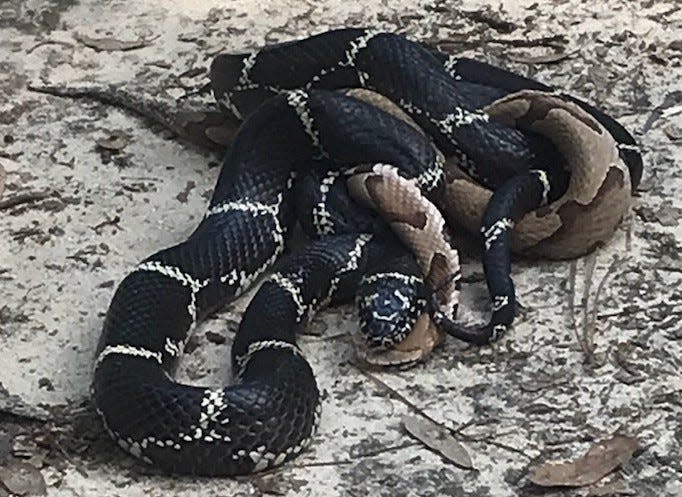Campbell Vaughn: You should not kill snakes, but you should get to know them

The word snake gets such a wide variety of reactions from most people just by mentioning even the word.
“Snakes are so cool” is the one that I like. Another common one: “The only good snake is a dead snake.” I have a hard time biting my tongue when I hear that one.
I understand that they can be a little creepy, but they really are unique and beneficial creatures.
This is the time of year we start encountering more snakes. They are breeding and moving around a good bit. It isn’t too hot for them, so there is a good chance you might have one lurking nearby. The resent cicada invasion was a good food source for all animals including snakes, so the populations should be on the rise this year.
I had a group of teenage boys up to the cabin in Lincoln County this past weekend and the first thing I told them not to do when we got up there was kill a snake. And then I seconded that by asking them to be careful on the golf cart and not to drown.

The reason I mentioned to them not to kill a snake is because every time some ding dong kills one of the rat snakes or king snakes around the cabin, the mice move in. And I hate mice. They are disgusting little vermin. So, I do whatever I can to make sure I stay out of a snake’s way around the lake.
I was in the backyard piddling around the other evening and saw a couple of mockingbirds making a big stink near a brush pile I leave in the back part of my yard to give some extra habitat for birds and other critters. I knew exactly what the birds were up to, so I called my son outside to help find the snake. And sure enough, there was a black racer trying to stay as still as it could to avoid the wrath of those crazed mockingbirds.
This week, I had a regular reader send me a little bit of a scary picture of him stumbling upon a timber rattler under his bird feeder when he went out to fill it up. When all that grain food falls on the ground, mice, rats, squirrels and birds will come in full force, which is an easy meal for a big snake like that.
We have six venomous snakes in Georgia, so if you aren’t familiar with identifying snakes, it is obviously a good idea to be cautious around all snakes.
The venomous ones include the copperhead, water moccasin, eastern coral snake and three types of rattlesnakes -- pigmy, eastern diamondback and timber. I have never seen an eastern coral snake. Seeing an eastern diamondback is a rare thing because they are declining in numbers. But when you do, they are incredibly beautiful creatures. Water moccasins and copperheads scare me because they can be so camouflaged that you need a good eye to spot them. I have stepped over several copperheads and water moccasins over the years before I realized what I had done. I am also glad they were nice enough to let me pass in peace.
Campbell Vaughn: Enjoying a five-day fishing trip on a lazy river in Florida
A few years ago, I wrote a column on king snakes, which are native to the area, and got all kinds of feedback. King snakes are the best to have around because one of their favorite foods is copperheads. That relationship those two snakes have allows me to worry less about encountering one of those camo vipers. I even had someone send me one of the coolest pictures I have ever received from a lady living in Burke County who found a king snake eating a copperhead in her driveway.
It is illegal in Georgia to kill a non-venomous snake. Learn to identify them before passing judgement.
UGA’s Savannah River Ecology Lab has a fantastic herpetology site that can help you sort out what type of no legged crawlers you might be spotting out in the landscape. It is a fun website just to check out to not only look up regional snakes, but also lizards, frogs and toads, salamanders, turtles, and alligators. You can find the site at https://srelherp.uga.edu.
Keep an eye out for cool things happening in nature. Send me a picture. I love seeing them.
This article originally appeared on Augusta Chronicle: Campbell Vaughn: Snakes are beneficial and should not be demonized
